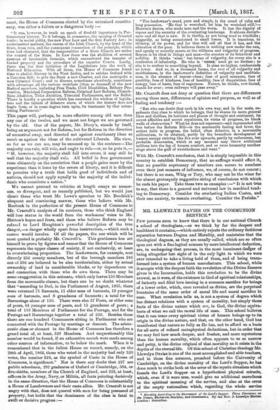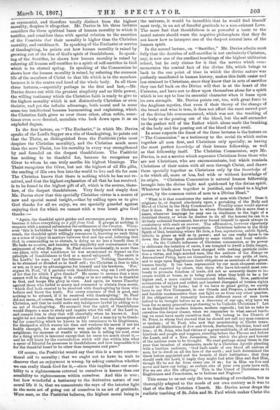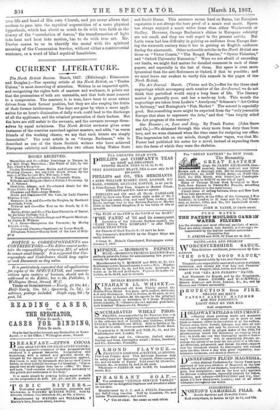Ma LLEWELYN DAVIES ON THE COMMUNION SERVICE.* - FEW persons seem
to know that there is in our national Church a school of theologians,—as we think by far the deepest and healthiest it contains,—which entirely rejects the ordinary fictitious separation between Dogma and Morality, and maintains that the , theological dogmas, as they are usually called, which are so often spun out with a fine logical acumen by mere intellectual deduction, are, in undergoing that process, in the most imminent dattger of being altogether lost sigitt of in the only light in which we were ever intended to take a living hold of them, and of being trans.. formed into a system of human manufacture. This school, while it accepts with the deepest faith the revelation of the Divine Essence given in the Incarnation, holds this revelation to be the divine avowal, as it were, of the existence in God of spiritual relationships, of fatherly and filial love issuing in a common sacrifice for beings of a lower order, which, once revealed as divine, are the perpetual fountains of the same order of moral life and moral sacrifice in man. What revelation tells us, is not a system of dogma which has distant relations with a system of morality, but simply those facts of the divine nature which are, in God, the divine equiva- lents of what we call the moral life of man. This school believes that it can trace every spiritual virtue of human beings up to its origin in the divine nature, and that, on the other hand, God has manifested that nature so fully as He has, not to afford us a basis for all sorts of refined metaphysical deductions, but in order that we may feel how much deeper, and fresher, and more mysterious than the human morality, which often appears to us so narrow and petty, is the divine original of that morality as it exists in the depths of the eternal life. Of this school of Christian theology Mr. Llewelyn Davies is one of the most accomplished and able teachers, and in these fine sermons, preached before the University of Cambridge, on the divine morality of the Lord's Supper, he has done much to strike both at the error of the mystic ritualism which founds the Lord's Supper on a hypothetical physical miracle, which, even if it were true, would give no additional sacredness to the spiritual meaning of the service, and also at the error of the empty rationalism which, regarding the whole service
Morality According to The Sacrament of the Lord's Supper. Three Discourses on the Names, Nueharist, Sacrifice, and Communn. By the Rev. J. Llewelyn Davies. London: Macmillan.
as ceremonial, and therefore totally distinct from the highest morality, despises it altogether. Mr. Davies in his three lectures considers the three spiritual bases of human morality to which it testifies, and considers them with special relation to the assertion of the Comtists that their morality is higher than the Christian
morality, and outshines it. In speaking of the Eucharist or service of thanksgiving, he points out how human morality is raised by growing out of the Son of God's spirit of thankfulness. In speak- ing of the Sacrifice, he shows how human morality is raised by referring all human self-sacrifice to a spirit of self-sacrifice in God which is its eternal spring. In speaking of the Communion he
shown how the human morality is raised, by referring the common life of the members of Christ to that life which is in the members because it is the centre and head of the whole body. In all these three lectures,—especially perhaps in the first and last,—Mr. Davies draws out with the greatest simplicity and no little power, the willing testimony which the Christian faith is ready to give to the highest morality which is not distinctively Christian or even theistic, and yet the infinite advantage, both moral and in some sense too intellectual because harmonizing and explaining, which the Christian faith gives us over those other, often noble, some- times even more devoted, moralists who look down upon it as an exploded dogma.
In the first lecture, on "The Eucharist," in which Mr. Davies speaks of the Lord's Supper as a rite of thanksgiving, he points out that the Theist, as distinguished from the Positivist (who most -despises the Christian morality), and the Christian much more than the mere Theist, has his morality in every way strengthened by and founded on the deepest thankfulness. The Positivist bas nothing to be thankful for, because he recognizes no Giver to whom he can truly ascribe his highest blessings. The Theist recognizes the (liver, but not the highest of all His gifts, the sending of His own Son into the world to live and die for man The Christian knows that there is nothing which he has not re- oeived, and that the highest explanation of all that he has received. is to be found in the highest gift of all, which is the source, there- fore, of the deepest thankfulness. Very finely and simply does Mr. Davies show that this specially Christian virtue is a source of new and special moral insight,—that by calling upon us to give -God thanks for all we enjoy, we are specially guarded against enjoying that for which we cannot with a true heart give God thanks :—
" Again, the thankful spirit guides and encourages punty. It does so, because it takes everything as a gift from God. It grasps at nothing, it respects with a natural submission the ordinances of the Creator. When- ever this is forbidden' is marked upon any indulgence within a man's reach, the thankful spirit willingly renounces it, knowing no such thing as a sense of injury in matters between God and tbe soul, believing that God, in commanding us to abstain, is doing us no less a benefit than if He bade us receive, and turning with simplicity and contentment to the enjoyment of what He gives. St. Paul shows incidentally, in more than -one place, with what confidence he was accustomed to depend on the principle of thankfulness to God as a moral safeguard. 'The earth is the Lord's,' he says, and the fulness thereof.' Nothing, therefore, is to bo shunned or dreaded as in itself evil ; the Christian is free to take or not, as it may be advantageous for himself and his brethren. For,' argues St. Paul, if I partake with thankfulness, why am I evil spoken of for that for which I give thanks ?' He seems to assume that a man cannot well be doing wrong, if in eating or in not eating he is thankful to God, and keeps His glory in view. And again, he warns Timothy against those who forbid to marry and command to abstain from meats, 4which God bath created to be received with thanksgiving by them who believe and know the truth. For every creature of God is good, and nothing to be refused, if it be received with thanksgiving.' St. Paul did not mean, of course, that laws and ordinances were abolished for the Christian, and that he could make any indulgence lawful by adding to it an act of thanksgiving. He assumed that the spirit of thankfulness would dispose a man to study and inquire what the will of the Lord is, and compel him to obey that will cheerfully when he knows it. And might he not make that assumption safely? Let a man try to be thank- ful for something which be knows in his conscience to be illegitimate, for dissipation which wastes his time and weakens his moral if not his bodily strength, for an advantage won unfairly at the expense of a neighbour, for increase of wealth to which he is selling his soul, even for a thing which is innocent except that he cares too much about it,— and he will learn by the contradiction which will rise within him what a spear of Ithuriel he possesses in thankfulness, and how impossible it is for the thankful heart to be other than temperate and pure."
Of course, the Positivist would say that this is a mere conven- tional aid to morality ; that we ought not to have to wait to discover that an enjoyment is wrong, by asking ourselves whether we can really thank God for it,—since this implies that our sensi- bility to a righteousness external to ourselves is keener than our sensibility to righteousness within ourselves. And this is true ; but how wonderful a testimony to the derivative nature of our moral life it is, that we concentrate the rays of the interior light in the mere act of going out of ourselves in an act of gratitude.
Were man, as the Positivist believes, the highest moral being in the universe, it would be incredible that he would find himself most truly, in an act of fanciful gratitude to a non-existent Love. The mere fact that thankfulness is so powerful a tonic to the moral nature should warn the negative philosophers that they do not know how to interpret one of the deepest natural laws of the human spirit.
In the second lecture, on "Sacrifice," Mr. Davies admits most fully that the doctrine of self-sacrifice is not exclusively Christian, nay, is now one of the cardinal teachings of the highest utilitarian school, but he only claims for it that the service which com- memorates the central fact of the divine life, which brings us back to the one point of time in which the divine nature was perfectly manifested in human history, makes this faith easier and less strained to Christians, since they know that in acts of sacrifice they can fall back on the Divine will that is at the heart of the Universe, and have not to draw upon themselves alone for a spirit which is too apt to lose its essential character when it leans upon its own strength. Mr. Davies points out, too, with great force to the Anglican mystics, that even if their theory of the change of the bread and wine is true, it does not affect the most sacred part of the divine life commemorated, which was not the teaching of the body or the pouring out of the blood, but the self-surrender, to the perfect will of the Father which alone made the breaking of the body and the pouring out of the blood of any avaiL
In some respects the finest of the three lectures is the lecture on "The Communion" as a testimony to the social tie which unites together all men first, and Christians only specially, as having the most perfect knowledge of their human fellowship, as well as that fellowship itself. The Christian Communion, says Mr. Davies, is not a service which separates Christians from those who are not Christians, who are excommunicate, but which reminds Christians of their union with all men through Christ, and draws them specially together as Christians only by the knowledge of a tie which all, more or less, feel with or without knowledge of its origin. "Christian Communion is natural human fellowship brought into the divine light and quickened by the divine spirit. Whatever binds men together is justified, and raised to a higher power, by the common union of men to a Divine Head."
"What is it that constitutes the union of men with Christ ? Does it originate in, or depend absolutely upon, a partaking of the Body and Blood of Christ in the Holy Communion ? Possibly some would answer that it does. But no Christian to whom Christian life is more than a name, whatever language he may use in obedience to the logic of a doctrinal theory, or when he desires to do all the honour he can to a divinely ordained Sacrament, has ever forced himself to speak always in consistency with such an answer. The affirmation, however rigorously intended, is always spoilt by exceptions. Christians believe in the Holy Spirit of God, breathing where He lists, a free, mysterious, subtle Spirit„ infinite in grace as well as in power; and no one really dares to tie. down the Divine Spirit absolutely to some visible and local vehicle. . . . . On the Catholic influence of Christian communion, or its power to obliterate the isolation of races, I am tempted to dwell a little longer, because we in England have been charged with making patriotic isola- tion a virtue, and high-minded men, like the authors of the Essays on International Policy, have sot themselves to rebuke our pride of race, and to urge upon Englishmen their obligations as members of the great human family. It has been represented by our moat eloquent states- men and repeated by others, that those who have laboured moat zea- lously to promote freedom of trade, did not so earnestly desire to in- crease wealth at home, as to bring about what they hold to be a far higher end, a more cordial international fellowship. Now, particular accusations of unjust and selfish and insolent disregard of human rights should be tested by feats; but if we have to plead guilty, we surely have in our New Testament, in our Creeds and Prayers, a more direct and forcible condemnation than can light on us from any other quarter. If the obligations of humanity between different raoes of men have indeed to be brought before us as a discovery of our ago, why have we been for so many generations professing to be Catholic Christians ? Let us be thankful for modern lessons, modern reproof.; but let us take to ourselves the deeper shame, when we remember to what sacred teach- ing we must have made ourselves deaf. We belong to the Church of St. Peter, to whom God showed that he should not call any man common or unclean ; of St. Paul, who saw that membership in Christ trans- cended all distinctions of Jew and Greek, Barbarian, Scythian, bond and free ; of St. John, who had visions of a great multitude, of all nations and kindreds and people and tongues, standing before the Throne and before the Lamb, and of a New Jerusalem, into which the glory and honour of the nations were to be brought. Wo read perhaps many times in the year that broadest of statements, made by a Christian Apostle pleading with a heathen audience, God bath made of one blood all nations of men, for to dwell on all the face of the earth ; and hath determined the times before appointed and the bounds of their habitation ; that they should seek the Lord, if haply they might feel after Him and find Him, though He be not far from every one of us ; for in Him we live and move and have our being; as certain also of your own poets have said, For we are also His offspring.' This is the Creed of Christians as to Englishmen and Frenchmen, as to Indians and Negroes."
This seems to us•not only the true teaching of revelation, but as thoroughly adapted to the needs of our own century as it was to that of the first Christian Church. Mr. Davies never drops the realistic teaching of St. John and St. Paul which makes Christ the true life and bond of His own Church, and yet never allows that realism to pass into the mystical superstition of a mere physical hypothesis, which has about as much to do with true faith as the theory of the "correlation of forces," the transformation of light into heat and heat into motion, has to do with true art. Mr. Davies seems to us to identify the moral with the spiritual meaning of the Communion Service, without either a controversial sentence, or a word of blind mystical fanaticism.
































 Previous page
Previous page